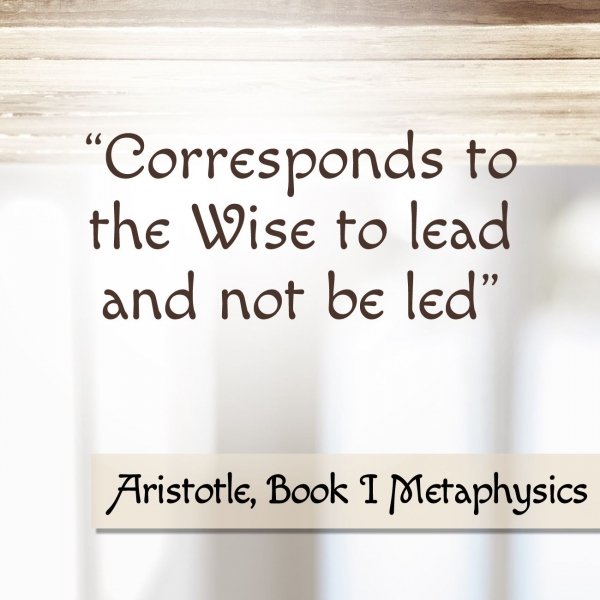Aristotle introduces us to the study of wisdom as science and virtue in his book metaphysics. The metaphysics as science focuses on the study of the immovable and eternal entities: and this is the ontology and the wisdom.
For Aristotle, the wisdom is the perfect science, the science of truth, the substance, the ultimate and first causes.
And who is the person who teaches this science? The medicine is a science there is the person who is ignorant of medicine, there is the person who opine of medicine, and the person who knows of medicine, this last person is called "doctor of medicine".
The same goes for wisdom, who knows of wisdom is called "doctor of wisdom", Aritotle calls him "the wise". But here a difference appears, the wisdom is a virtue granted by God. The wise order, correct, teach, rehabilitate, lead.

In his book "Politics", Aristotle explains that there are three virtuous regimes and three corrupt regimes. The virtuous regimes are the monarchy (the government of one), the aristocracy ( the government of a few), and the republic (the government of many).
The monarchy is the government of the wise, not the "king". In any case, the wise when he rules, Aristotle calls him "king".
Every virtuous government has its sustenance in practical wisdom and its source the "doctor of wisdom", and this regime can be monarchy, aristocracy or republic. Or a mixture.
"Corresponds to the wise to order", adds Aristotle in his works.
An example of how the wise order and lead is through the perfect virtue of the counsel (perceive with attention, meditate with intuition and inspiration, decide), we have an example in the bible, the wise resolve what is presented to his judgment as God in person, 1 Kings 3:16-28:
"Now two prositutes came to the king and stood before him. One of them said, "Oh, my Lord. This woman and I live in the same house, and I had a baby while she was there with me. The third day after my child was born, this woman also had a baby. We were alone; there was no one in the house but the two of us.
During the night this woman's son died because she lay on him. So she got up in the middle of the night and took my son from my side while I your servant was asleep. She put him by her breast and put her dead son by my breast. The next morning, I got up to nurse my son - and he was dead! But when I looked at him closely in the morning light, I saw that it wasn't the son I had borne."
The other woman said, "No! the living one is my son; the dead one is yours".
But the first one insisted, No! the dead one is yours; the living one is mine". And so they argued before the king.
The king said, "This one says, "My son is alive and your son is dead", while that one says, "No! Your son is dead and mine is alive".
Then the king said, "Bring me a sword". So they brought a sword for the king. He then gave an order: "Cut the living child in two and give half to one and half to the other".
The woman whose son was alive was deeply moved out of love for her son and said to the king, "Please, my lord, give her the living baby! Don't kill him!"
But the other said, "Neither, I nor you shall have him. Cut him in two!"
Then the king gave his ruling: "Give the living baby to the first woman. Do not kill him; she is his mother."
For more information, visit my profile, follow the link and download for free my ebook.